Vice, a work of dark political satire released into a currently politically overheated world, is not exactly a consensus opinion kind of movie. It's more in that "best movie of the year to one critic, worst to another" category. And those who hate it, really hate it. They argue Vice amounts to little more than a series of weak SNL sketches which combine to either lionize one of recent history's greatest monsters or wildly oversimplify him, letting far too many other offenders from the Bush administration, including good ol' GW himself, off the hook. Also, it's a movie which seems to hate half of its audience, according to Slate.com 's impassioned takedown of the film's meta-focus group scene.
Vice 's defenders, however, admire its ambition, experimentation, very now message about the danger of unfettered executive power and across-the-board fantastic performances from Christian Bale as Dick Cheney, Amy Adams as Lynne Cheney, Steve Carell as Donald Rumsfeld, and Sam Rockwell as GW.
Given the subject matter, the mood of the day, and the possibly ill-advised attempt to cram a story vast enough to warrant a mini-series into a 132 minute Oscar contender, this diverse reaction has probably been inevitable since the moment Vice was announced as director Adam McKay's next movie, his first since 2015 Best Picture nominee The Big Short. The pairing of director and project certainly made sense. Making deceptively entertaining explainer movies which use comedy and damn near every directing trick in the book to argue the Bush administration ruined the world is just McKay's bag now. Apparently.
I loved it when McKay used that formula with The Big Short, which perfectly brought home just how furious we all should be about the lack of accountability for everyone who caused the housing crisis and Great Recession last decade. He's back at it again with Vice, his Dick Cheney biopic which takes an hour to cover Cheney's first 60 years on Earth and then another to cover his 8 years with Bush and ultimately pins just about everything wrong with modern American politics and democracy on Cheney's perpetually scheming shoulders. Yet, this time I'm left a little cold.
At first, I wasn't sure why, exactly, I felt that way. Vice is every bit a match to The Big Short in terms of ability to simplify difficult concepts into easily understandable plot points. The Big Short, for example, had a bathing Margot Robbie explain mortgage-backed securities (insert anti- Big Short hot take about McKay's assuming a straight, white male audience) and a busy-in-the-kitchen Anthony Bourdain breaking down collateralized debt obligations, to name but a few of the celebrity explainer cameos.
Vice doesn't lean on this trick as heavily, but it does quite memorably depict Cheney, Donald Rumsfeld, and their Bush administration allies thinking up their worst, most egregiously amoral policies as if they were diners ordering from a menu offered up by a waiter played by Alfred Molina, of all people.
The effect is that while you may not remember every detail of a long New York Times article you read about the housing crisis or much of anything from Bob Woodward's various books about the Bush administration, you'll forever remember Robbie mixing sex appeal with exotic bank investments and a gluttonous Christian Bale, Steve Carell and others ordering torture off a dinner menu. That's an abhorrent thought to critics of either film, but it's the reality of the transformative power of film.
You need only watch a single episode of Last Week Tonight with John Oliver to see that what McKay is doing here - essentially, using Avante-Garde sketch comedy to explain politics - is hardly unique anymore, but he's the only one doing it in major movies right now, especially since global box office concerns have led most other social-minded filmmakers to speak to today's ills through metaphor. Not even Jay Roach, former comedy guru ( Austin Powers, Meet the Parents) turned HBO Original Film guy ( Recount, Game Change), is doing it quite like McKay.
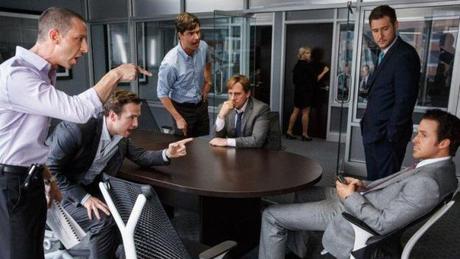
There's an inherent problem, however, with taking the every-trick-in-the-book filmmaking formula which fueled The Big Short and applying it almost equally to Vice. The Big Short, from a storytelling standpoint, is about a group of outsiders uncovering systemic corruption and realizing there is nothing they can do to stop it. (I realize that labeling a bunch of hedge fund managers and bankers "outsiders" seems wrong on its face, but the characters in The Big Short are basically economic vultures who recognize a dying body before anyone else.) This, in turn, invites the audience to identify not with the architects of doom but simply those who got close enough to notice the oncoming storm before everyone else. We are taken on the same journey of discovery as the characters and identify with their disgust at what they learn along the way.
Vice is the complete opposite. As a biopic about a man who started out as a White House intern during the Nixon administration and eventually held job titles like Secretary of Defense, White House Chief of Staff, House Representative and corporate CEO before becoming the Vice President/Shadow President in one of the most influential administrations in American history, Vice is the ultimate insider's story. It invites us into the belly of the Washington politics beast, riding along with Cheney at every one of his most influential life moments.
We glimpse one shady backroom meeting after another and follow the career of a man and party whose sole goal seems to forever be the acquisition of power. When, early on in his career, he asks his mentor Rumsfeld what they actually believe he's laughed at as if he was telling a joke - there's no believing in politics; there's simply winning and losing, he learns. This scene has become a point of contention among historians and political reporters who argue Cheney's actual conservative viewpoints and philosophies cannot be so easily brushed away, but the viewpoint of the movie is clear that a half-century of money-grabbing, power-hungry Republican politics has destroyed the country, with Cheney being at the forefront of the movement.
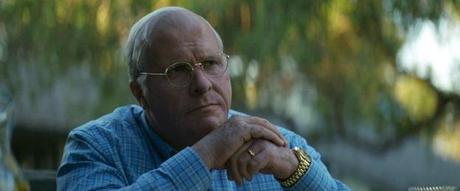
This makes Vice, in some ways, an anti-biopic. Most films of this form aspire to help the audience understand a great man or woman and their various flaws. Vice instead challenges itself AND the audience to find one redeeming quality in such an abject monster. You think you've finally found it past the halfway mark when Cheney's adult daughter Mary comes out as gay to the family and is met with a hug and understanding from her father instead of rejection. At the very, very least, Vice argues, Dick Cheney loves his kids and ultimately abandons a Presidential candidacy of his own years before GW ever comes calling. To spare his daughter and family the scrutiny, he reorients his goals in life and leaves politics entirely.
The monster, it seems, has a heart - albeit one that constantly threatens to give out on him considering the almost comically high number of heart attacks he's had, but a heart nonetheless.
This is when Vice rolls out one of its most talked about jokes - a mid-movie credits roll which imagines how life would have gone had the Cheney's truly stayed out of politics. They - and, by extension, the world - would have been better off, and any Dick Cheney biopic could have ultimately been the story of an ambitious, but flawed man who eventually chose family over party and did more good in the world once he left the rotting cesspool that is Washington.
It's one of the more effective narrative experiments in the entire film, simultaneously poking fun at how these stories would normally end while also briefly inviting us to enjoy the fantasy of if things had actually ended there. But, we know GW is gonna come a calling and 9/11, the wars in Iraq and Afghanistan, enhanced interrogation techniques, no-bid Halliburton contracts, Gitmo, and the shadow presidency all beckon. After all, that old man, Harry Whittington, isn't going to shoot himself in the face.
Vice gets to all of that, but as the world stakes rise you start to feel McKay's intrusion more. An extended bit in which Bale and Adams adopt Shakespearean dialogue to imagine the Cheneys as modern-day MacBeths pokes fun at the obvious artifice of ever daring to proclaim you actually know what happened in such deeply important, but entirely private conversations. However, is this really all that clever an observation on McKay's part or is it just a scene wasting time on meta-comedy in a story which demands a closer, more sober-minded treatment?
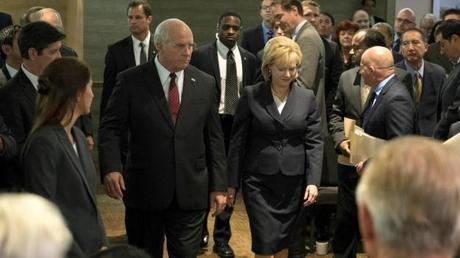
The tricks, so effective in The Big Short, begin to feel a little cutesy, and the storytelling stops illuminating anything new about Cheney. There's no outlet for us as an audience. We are suffocated in the embrace of such a scheming, cold individual who is ultimately robbed of his sole redeeming feature in a finale which attempts a The Godfather Part II "Michael Corleone has finally lost his soul" turn but does so in the most bluntly obvious way possible. SPOILER A biopic about a man often thought by history to have no heart ends on a close-up of his diseased, disgusting heart, post-transplant.
This is why when Variety's podcaster Kris Tapley interviewed Christian Bale and Sam Rockwell recently he began by admitting to them that while he liked Vice it left him feeling completely empty as if he'd spent the past two hours staring into the void of a soulless individual. Bale, of course, pushed back on that, arguing - as actors always do- that his challenge was to find the humanity in the man, and he thought he pulled it off.
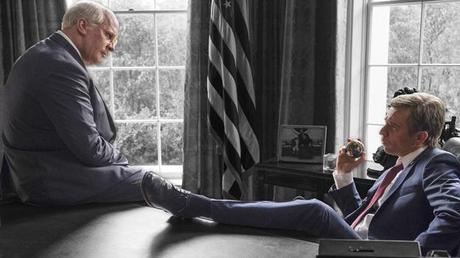
Critics differ on whether that's true, and I don't envy Bale's tricky balancing act. He has to find the humanity in a character in a movie which ultimately concludes his character eventually loses what little humanity he ever really had. That viewpoint on McKay's part is almost admirable in how nakedly partisan it is. At a time when Democrats are still debating whether to take a soft or hard approach to Trump and his Republican allies, McKay is here with a clearly angry movie which aims to remind an overworked, overstressed, and over distracted populace just how truly pissed off they should be.
But McKay hides that anger in meta-comedy, explainer sketches, and plenty of oversimplifications. It's a formula that worked wonders in The Big Short. With Vice, though, we are not going along with the outsiders; we're hitched to the ultimate Washington insider. It makes for a nauseating ride, one where the jokes and look-at-me filmmaking eventually feel out of place considering the literally hundreds of thousands of deaths on the line due to Bush-Cheney's various wars.
I think McKay knows that. I think he knows that at a certain point any telling of Dick Cheney's life ceases to be a laughing matter. The gimmicks and jokes are just the sugar he uses to help the medicine go down, and in this case, the medicine is the reminder that we should never forget just how disastrous Dick Cheney's career was to this country. It's the rare biopic that ultimately concludes with "Yeah, fuck that guy," but Adam "I killed a guy with a trident!" McKay doesn't make conventional movies. The Big Short did it better, but Vice at least has one heck of a Christian Bale performance and a surprising amount of anger.
What's your take on Vice? Let me know in the comments.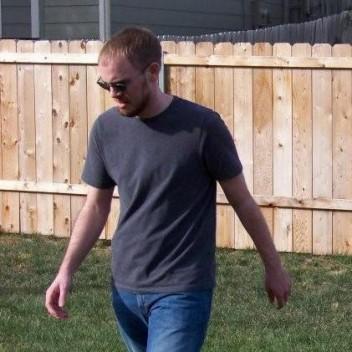
Grew up obsessing over movies and TV shows. Worked in a video store. Minored in film at college because my college didn't offer a film major. Worked in academia for a while. Have been freelance writing and running this blog since 2013. View all posts by Kelly Konda

